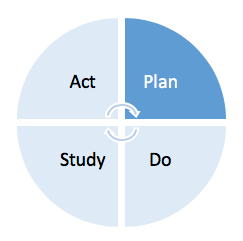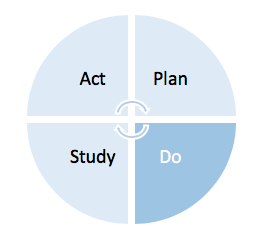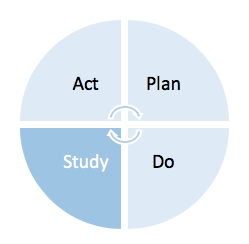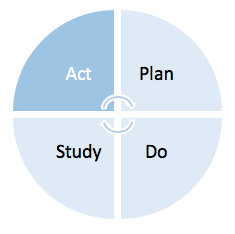
QI/QA Department ‘tests’ remote working
23rd March 2020

On Friday the 13th March (was that a sign?) we conducted our first ‘test’ of total remote working. Little did we know then that this way of working would quickly become the norm for millions of workers across the globe. It became apparent that we would need to do a longer test. So, based on our learning from the first day we then ‘tested’ remote working for one week from the 16-20th March.
As with all improvement work we first developed our theory and asked a series of questions with predictions (Table 1.) predicting that if we used social platforms and software (‘MS teams’, ‘WebEx’ and ‘MS SharePoint’) appropriately we would be able to communicate and operate as normal.
Table 1. We asked a series of questions and made predictions

How did we do this?
We used the Plan, Do, Study, Act (PDSA) approach which informed our learning
1st test cycle – ‘one day of remote working’
 Plan: Plan the test, including the plan for collecting data
Plan: Plan the test, including the plan for collecting data
We want to work remotely for one day
We predict that the team would accept the challenge to work remotely.
- Who: The QI team ( 17 members).
- What: Use virtual platforms such as WebEx and MS teams to enable virtual meetings and remote working
- When: 13th March
- How: conduct one ‘business’ meeting in the morning for QI team using MS teams and a second ‘social’ meeting in the afternoon for both QI and QA using WebEx
- Data collected: Number of team’s members accepting invitation; feedback from team; review of technical issues.
 Do: Run the test on a small scale
Do: Run the test on a small scale
What happened?
- All team members who were present at work attended
- Some technical difficulties were experienced but resolved in real time
- Both sessions lasted 30 mins
- Morning session for business, afternoon session – social connection and fun
- Team asked about their experience and would they be willing to test a week of remote working
 Study: Analyse the results and compare to the predictions
Study: Analyse the results and compare to the predictions
- Conducted on time and successfully
- Minimal issues with technology but resolved quickly
- All staff happy with suggestion to test for week
- Established key learnings (fig. 1)
 Act: We can adapt, abandon, adopt – plan for our next test for week commencing 16 March 2020
Act: We can adapt, abandon, adopt – plan for our next test for week commencing 16 March 2020

Figure 1

Our 1st challenge for our daily ‘15 minutes of fun’- wearing your silliest hat to the meeting
2nd test cycle – ‘one week of remote working’
On Monday 16th March we planned and conducted our second ‘test’ of total remote working but this time for one week. Globally, more and more organisations were doing the same and there was an abundance of literature being circulated to inform remote working (we have provided some links)
 Plan: Plan the test, including the plan for collecting data
Plan: Plan the test, including the plan for collecting data
We want to work remotely for one week
We predict that the team would accept the challenge to work remotely.
- Who: The QI team (17 members).
- What: Use virtual platforms such as WebEx and MS teams to enable virtual meetings and remote working
- When: 16-20th March
- How: conduct one ‘business’ meeting in the morning for QI team using MS teams and a second ‘social’ meeting in the afternoon for both QI and QA using WebEx. Develop weekly objectives with the team for work allocation. Use SharePoint for document collaboration. Assign a ‘host’ for each meeting.
- Data: Number of team’s members accepting invitation; feedback from team; review of technical issues. Feedback from team using ‘menti.com’ survey to enquire what went well? What didn’t and what we could do to improve?
 Do: Run the test on a small scale
Do: Run the test on a small scale
What happened?
- All team members who were present at work attended
- Some technical difficulties were experienced but resolved in real time
- Both sessions lasted 30 mins
- Morning session for business, afternoon session – social connection and fun
- Conducted a menti.com survey at the end of week
- Progress of the objectives for the week were monitored daily and changed as priorities changed.
 Study: Analyse the results and compare to the predictions
Study: Analyse the results and compare to the predictions
- Conducted on time and successfully
- Minimal issues with technology but resolved quickly
- Staff reported fatigue with back to back meeting, risk of loneliness and that some felt there may be a risk of micro-management
- Overall it was reported that remote working was going well however, there were concerns expressed over long-term sustainability and staff wellbeing
- Established key learnings (fig. 2)
 Act: We can adapt, abandon, adopt – using the key learnings from the test on what we can do to improve (fig 2.)
Act: We can adapt, abandon, adopt – using the key learnings from the test on what we can do to improve (fig 2.)

Figure 2
As we move forward continuing this unknown dynamic journey, it seems we will be continuing our remote working for some time but going forward will adopt the suggestions to improve.
The team were also asked in as few words as possible word what would you suggest to others embarking on remote working, the team said….

Some further highlights…

After works drinks ‘pub’ quiz using Pareto chart

Group exercise – Day 3 ’15 mins of fun’

Lunch portrait – Day 2 ’15 mins of fun’
Most Read Stories
-
Why is Quality Control important?
18th July 2018

-
An Illustrated Guide to Quality Improvement
20th May 2019

-
2016 QI Conference Poster Presentations
22nd March 2016
-
Recognising Racism: Using QI to Help Take Action
21st January 2021

-
Using data enabled us to understand our problem
31st March 2023

-
QI Essentials: What does a Chief Quality Officer do?
18th March 2019


Follow QI on social media
To keep up to date on the latest concerning QI at ELFT, follow us on our socials.


